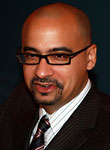Junot Díaz joins alumni authors to celebrate a century of creative writing at Cornell
By Daniel Aloi

Novelist Junot Díaz, M.F.A. '95, will visit Cornell in February for the first time since winning the 2008 Pulitzer Prize for fiction for "The Brief Wondrous Life of Oscar Wao."
His two-day visit will kick off "The Centennial Plus Five Celebration of Creative Writing at Cornell," a series of events in 2009 highlighting Cornell writers and their work.
Díaz, a professor of creative writing at the Massachusetts Institute of Technology and fiction editor of Boston Review, will be presented with the Cornell Council for the Arts' annual Eissner Artist of the Year Award and will give a reading Feb. 19 at 4:30 p.m. at the Herbert F. Johnson Museum of Art. A reception and dinner also will be held.
On Feb. 20, he will take part in a Centennial Reading with fellow M.F.A. graduates Melissa Bank '88 ("The Girls' Guide to Hunting and Fishing") and Julie Schumacher '86 ("Black Box," "An Explanation for Chaos") at 7:30 p.m. in Rockefeller Hall's Schwartz Auditorium. A book signing and Q&A session with Díaz are also scheduled.
He also will participate in a Latino Studies Program-sponsored panel on the arts and immigration, Feb. 19 at 2 p.m. at the Johnson Museum. Díaz was part of a graduate student effort in the mid-1990s to improve Latino studies and the Latino experience on campus, which led to the establishment of Cornell's Latino Living Center.
Díaz wrote most of his first collection of short stories (published as "Drown" in 1996) while in the Creative Writing Program at Cornell. "Oscar Wao," his semiautobiographical debut novel about the immigrant experience and much more, focuses on a science fiction- and fantasy-obsessed misfit living with his Dominican-American family in New Jersey. The novel also won the 2007 National Book Critics Circle Award for Fiction.
"This is not just a writing program that develops M.F.A.s," said Creative Writing Program director Helena María Viramontes. "This is a writing program that nurtures incredible talent -- people who engage in the social sciences and engage in politics."
The program sponsors a reading series each semester supported by a gift from two anonymous alumni donors. This year, readings will be tied to the centennial celebration. The readings "have given us the opportunity to bring in these huge names," Viramontes said. "They meet with undergraduate students, and they really enrich and engage and create this ambiance around them."
Centennial Readings on Feb. 26 and April 16 will feature alumni poets and fiction writers, including Emily Rosko and Stewart O'Nan.
Other events include a March 4 "Cornell Scholars on Cornell Writers" panel, discussing the works of A.R. Ammons, Thomas Pynchon, Manuel Muñoz and others; two community readings by more than 40 local writers, March 26 and Oct. 22 at Ithaca's State Theatre; and a publication party April 2 for new books by faculty members J. Robert Lennon, Kenneth McClane, Jonathan Monroe and Lyrae Van Clief-Stefanon. All events will be free and open to the public.
Cornell authors will be featured on Public Radio International's "Selected Shorts" this spring, with their work read by stage actors. A centennial anthology is also being prepared for publication, with an introduction by James McConkey.
Cornell first offered creative writing courses in 1905 as part of the English department curriculum. Since then, the university has counted many literary greats among its faculty and former students, including Pynchon, Ammons, E.B. White, Kurt Vonnegut Jr., Vladimir Nabokov, Lorrie Moore and Susan Choi; Pulitzer Prize winners Díaz and Alison Lurie; and Nobel laureates Toni Morrison and Pearl S. Buck. For a complete list, see http://www.writers.cornell.edu/.
Media Contact
Nicola Pytell
Get Cornell news delivered right to your inbox.
Subscribe